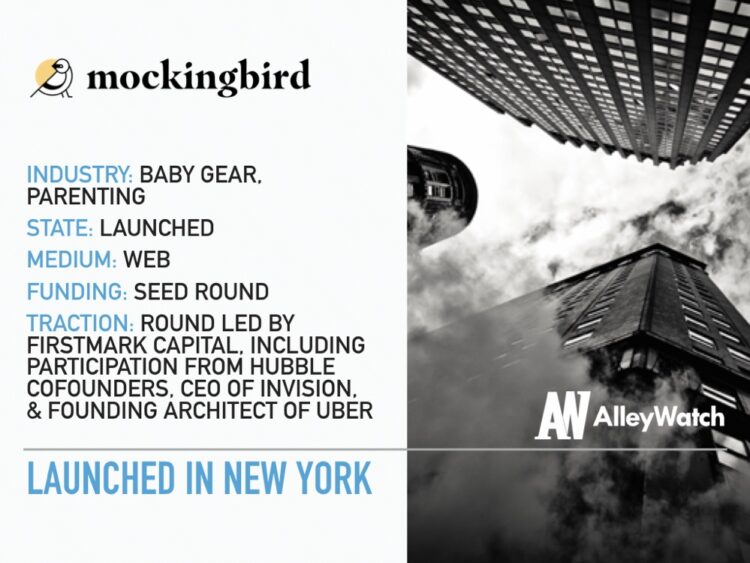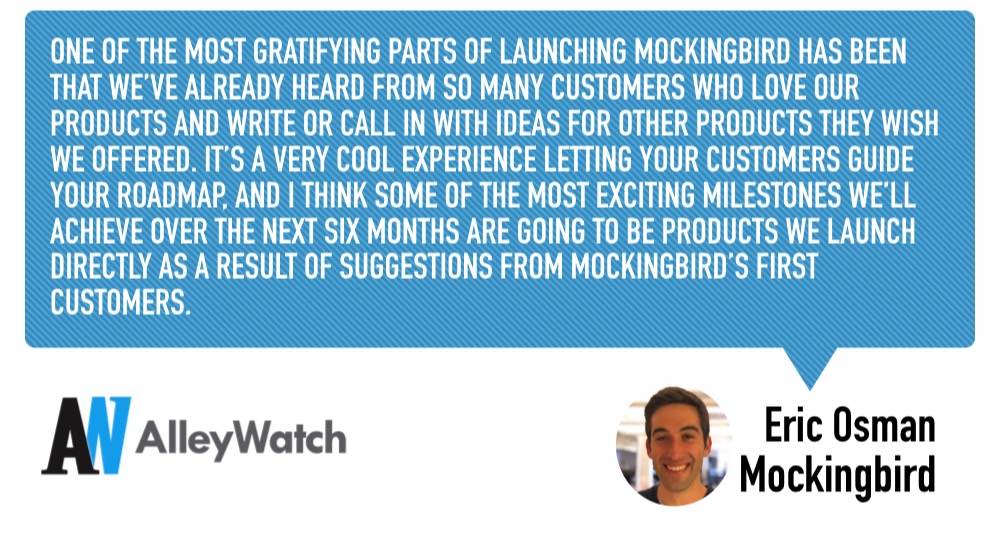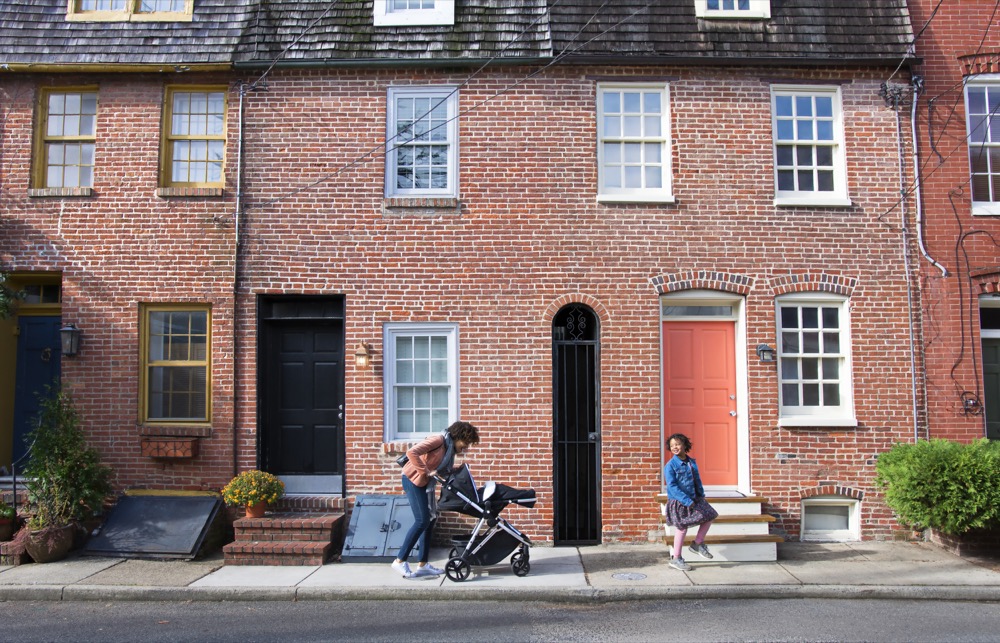There are an estimated 4M babies born in the US every year, and many of these new parents are millennials, a demographic characterized by their consumer savviness and brand loyalty. A tried and true marketing tactic to push parents to purchase the most expensive products is reliant on new parents’ anxiety and uncertainty. Mockingbird changes that through its DTC brand that empowers parents through products like the recently launched Mockingbird Stroller, which provides parents with the opportunity to test the stroller in the real world during a 30-day trial. Mockingbird’s flexible product and trial model gets parents acquainted with this luxury stroller, which costs 40% less than comparable strollers, in a natural and seamless way.
AlleyWatch chatted with founder and CEO Eric Osman to learn more about the inspiration for creating a modern, baby gear brand and the company’s future plans.
Tell us about the product or service that Mockingbird offers.
Mockingbird is a new baby gear brand that aims to empower parents and alleviate some of the stresses associated with entering parenthood. On February 26th, Mockingbird launched with a premium full-size stroller and a variety of companion accessories.
How is Mockingbird different?
Relying heavily on insights gathered from recent moms and dads, we created our products with today’s parents in mind – they’re on the go, juggling a million things, and have high expectations for both the functionality and aesthetics of the products they use. That’s why we prioritized three key factors: design, features, and most importantly, safety.
 The design of our flagship product, the Mockingbird Stroller, is sleek and customizable, meant to be a true extension of the parent’s style. For the stroller’s features, we built them with the simple goal of having our customers feel like “it just works.” With all the stories we heard about the challenges and frustrations of other strollers, we wanted to ensure ours would really help parents on days out with their child. With the Mockingbird Stroller, we included an easy one-hand fold, huge storage basket, full coverage sunshade, water-resistant fabrics, and many other convenient features. And since we take safety incredibly seriously, we created a customized testing program for all of our products that goes above both state and federal regulations. We utilize higher standards and run additional tests beyond those required by law.
The design of our flagship product, the Mockingbird Stroller, is sleek and customizable, meant to be a true extension of the parent’s style. For the stroller’s features, we built them with the simple goal of having our customers feel like “it just works.” With all the stories we heard about the challenges and frustrations of other strollers, we wanted to ensure ours would really help parents on days out with their child. With the Mockingbird Stroller, we included an easy one-hand fold, huge storage basket, full coverage sunshade, water-resistant fabrics, and many other convenient features. And since we take safety incredibly seriously, we created a customized testing program for all of our products that goes above both state and federal regulations. We utilize higher standards and run additional tests beyond those required by law.
With such premium design, features, and safety, Mockingbird fits cleanly into the luxury stroller category, yet we set our price at less than half of most of our competitors. We were able to do this by operating purely as a direct-to-consumer brand.
That means we bypass the markup – often 40 percent or more – that traditional retailers place on baby products. Direct-to-consumer also means we have a direct relationship with our customers. They can reach out to us by email, phone, text, live chat, or social media to get support and provide feedback.
We also wanted to make sure that, even though our products are sold exclusively online, our customers can still try them out in person. So, we offer free shipping on all orders and provide 30 days to use our products in the real world. When we ship our stroller, we encourage parents to fold it up, put it in their car, take it for a test drive, spill on it – whatever will help them make sure it’ll work well for their family. If, for any reason, it doesn’t, we provide a free shipping label to send it right back. We make it totally risk-free and even build in extra assurance with our lifetime warranty, which is very uncommon for stroller brands to offer. But we know that becoming a new parent can feel overwhelming, so we wanted Mockingbird’s products and the experience of buying them to be as seamless and stress-free as possible.
What market does Mockingbird target and how big is it?
Mockingbird caters to today’s new families, and there are about 4 million babies born in the US every year. The vast majority of these parents are millennials – savvy and empowered consumers who are not only comfortable with the direct-to-consumer concept, but also have better filters to see through questionable marketing tactics. Unfortunately, in this industry, companies have often relied on leveraging the anxiety of new parents to push them into unnecessarily buying the most expensive baby products. At Mockingbird, we try to strike a very different tone and bring the respect and honesty today’s consumers expect from the brands they engage with.
What is the business model?
I felt strongly that it was important to build Mockingbird as a direct-to-consumer brand. Cutting out the middleman allows us to provide our customers with much better value, a more convenient and risk-free buying experience, and a direct relationship for feedback and support.
What inspired the start of Mockingbird?
The direct-to-consumer model has become commonplace in so many product categories – mattresses, glasses, shoes, razors, clothing, the list goes on. One day I wondered why the same wasn’t true for baby products. In particular, when you think about all the benefits of the DTC model, it actually makes more sense for parents than pretty much any other consumer – saving money at a crucial time in their life, avoiding an overwhelming trip to the store, and removing all the risk from their purchase.
One day I wondered why the same wasn’t true for baby products. In particular, when you think about all the benefits of the DTC model, it actually makes more sense for parents than pretty much any other consumer – saving money at a crucial time in their life, avoiding an overwhelming trip to the store, and removing all the risk from their purchase.
I thought, if we can disrupt how this industry operates, improve the products, and change how parents interact with the brands they’re buying from, there was an opportunity to add real value here.
Who do you admire in the startup world and why?
Before starting Mockingbird, I worked at Harry’s, the men’s grooming startup. I have a tremendous amount of respect and admiration for the cofounders, Jeff Raider and Andy Katz-Mayfield. To be totally honest, in tough situations, I often think “what would Jeff and Andy do?” They have the rare gift of being able to focus on both the next 5 years as much as the next 5 days, and are not only incredibly smart, but also so well-intentioned. They exemplify the goal of doing well by doing good, and every employee there knows Jeff and Andy would do right by them – which is really saying something at an organization that’s now grown to over 300 people. They care deeply about what they’re building, and that serves as an infectious force that makes working there so rewarding and also shines through in the brand they’ve built. I truly think they’re both models of what it means to be a good leader today.
What are the milestones that you plan to achieve within six months?
One of the most gratifying parts of launching Mockingbird has been that we’ve already heard from so many customers who love our products and write or call in with ideas for other products they wish we offered. It’s a very cool experience letting your customers guide your roadmap, and I think some of the most exciting milestones we’ll achieve over the next six months are going to be products we launch directly as a result of suggestions from Mockingbird’s first customers.
What is the one piece of startup advice that you never got?
While it’s tempting to keep your focus purely within the four walls of the startup you’re building, make sure you still prioritize the relationships formed outside of them. Take that intro, meet up for that coffee, go to that event – not necessarily every day, but enough to keep expanding your network and learning from people working on totally different things. You develop a more well-rounded perspective and build meaningful connections when you least expect them. When I think about the people we’ve hired, the suppliers we work with, the other founders I turn to for help, so many of those relationships came from unexpected meetings that I’m now thankful I prioritized.
You develop a more well-rounded perspective and build meaningful connections when you least expect them. When I think about the people we’ve hired, the suppliers we work with, the other founders I turn to for help, so many of those relationships came from unexpected meetings that I’m now thankful I prioritized.
If you could be put in touch with anyone in the New York community who would it be and why?
Maybe Stephen Dubner. I love Freakonomics, both the book and the podcast, and I imagine a conversation with him must be so interesting. With the amount of business and behavioral economics information swirling around his head from all of his interviews and research, I feel like there would be so much to learn from him.
Why did you launch in New York?
I was born and raised in New York, and I think the startup scene here is amazing. It’s huge and thriving, but somehow feels small and connected enough to navigate it; it’s energetic and ambitious, but also stays pretty grounded and pragmatic; and most importantly, people here tend to be collaborative and supportive, rather than competitive and cutthroat.
What’s your favorite restaurant in the city?
Heidi’s House on the Upper East Side. Their menu changes frequently, the food is consistently amazing, and it has a kind of speakeasy vibe that makes you feel like you’re part of a secret club when you’re eating there.






